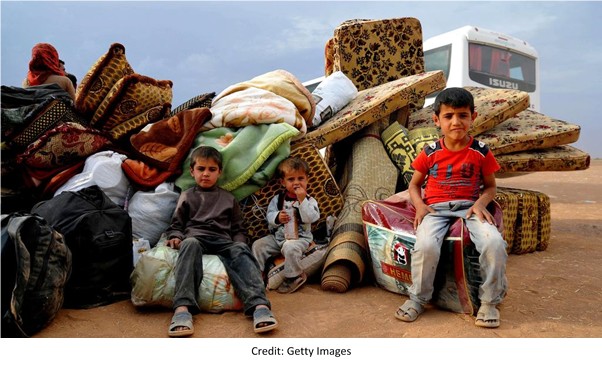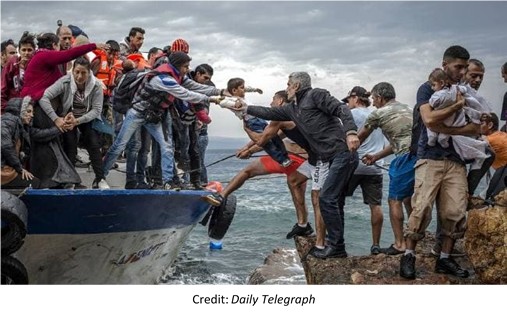20 June 2019
By: Giorgia Airoldi
 Today, 20 June 2019 marks World Refugee Day, a day for the commemoration of all human beings that had to flee from their places of origin and became refugees or internally displaced persons. Particularly, this year, on the 19th anniversary of the World Refugee Day, the UN’s goal is to show public support for all the families that were forced to flee and are suffering worldwide.
Today, 20 June 2019 marks World Refugee Day, a day for the commemoration of all human beings that had to flee from their places of origin and became refugees or internally displaced persons. Particularly, this year, on the 19th anniversary of the World Refugee Day, the UN’s goal is to show public support for all the families that were forced to flee and are suffering worldwide.
World Refugee Day was proclaimed in 2000 by the UN General Assembly in Resolution 55/76, to be celebrated from 2001. The reason why that specific date was chosen is because the year 2001 also marked the fiftieth anniversary of the 1951 Convention relating to the Status of Refugees, while on 20 June the Organization of African Unity was already celebrating the Africa Refugee Day.
With more than 68.5 million people forcibly displaced worldwide as a consequence of war, conflict, and persecution – one person is displaced every two seconds – the refugee issue is a worldwide phenomenon, affecting every single country on the globe. However, a lot of misconceptions and bias, often passed by media, have created a mistaken perception of the issue among modern societies. Hence, the importance of celebrating worldwide the World Refugee Day, in order to spread awareness and knowledge on the refugee issue.
World Refugee Day 2019
The 20 of June marks World Refugee Day, a day for the commemoration of all human beings who had to flee from their places of origin and became refugees or internally displaced persons. Particularly, this year, on the 19th anniversary of the World Refugee Day, the UN’s goal is to show public support for all the families that were forced to flee and are suffering worldwide.
World Refugee Day was proclaimed in 2000 by the UN General Assembly in Resolution 55/76, to be celebrated from 2001. The reason why that specific date was chosen is because the year 2001 also marked the fiftieth anniversary of the 1951 Convention relating to the Status of Refugees. Moreover, on 20 June the Organization of African Unity was already celebrating the Africa Refugee Day.
World Refugee Day is observed by more than 100 countries through local events involving government officials, humanitarian workers, celebrities, civilians and refugees.

Global Compact on Refugees
The last year has been marked by an important achievement in the development of a better global management of the refugee issue. On 17 December 2018 the United Nations General Assembly adopted the Global Compact on Refugees, a framework promoting cooperation at the international level to address the challenges posed by the refugee phenomenon. The framework was developed through a process involving meetings and consultations between UNHCR and States, that lasted for 2 years.
The Global Compact on Refugees acknowledges that the world’s response to large-scale movements remains inadequate and underfunded. Hence, it aims to promote an equitable sharing of responsibility, ensuring that host communities get the support needed. It is also aimed at enhancing refugee self-reliance.
The Global Compact includes the Comprehensive Refugee Response Framework that identifies as a key element the inclusion and integration of refugees in host communities from the beginning. The goal is to help refugees thrive, not just survive, through the recognition of the right to education and the right to work.
The Global Compact also adopted a Program of Action, in order to facilitate the application of a comprehensive response in support to refugees and countries particularly affected by a large refugee movement, or a protracted refugee situation. To support this, the Compact established a periodic Global Refugee Forum to include state representatives at the ministerial level. This will be convened for all United Nations Member States, together with relevant stakeholders, to announce concrete pledges and contributions towards the objectives of the global compact. In addition, the Compact included national and regional arrangements for specific situations, and tools for funding, partnerships and data gathering.
 Recent Developments
Recent DevelopmentsIn recent years, many have been given the impression that a refugee invasion has been occurring in the developed world, especially the US and Europe. This perception comes from the incendiary views that are depicted by media and politicians, describing the refugee phenomenon as a serious threat to our societies. However, based on the data, the real refugee situation is clearly different from the perceptions.
The number of refugees worldwide constitutes less than 10 per cent of the total number of migrants, and the vast majority of migrants are regular ones. In fact, 85% of refugees are hosted in developing countries. Turkey, Uganda, Pakistan, Lebanon and Iran are the top refugee-hosting countries. To get an idea of the proportions, consider that by the middle of 2018, Turkey hosted 3.6 million refugees while the rest of Europe hosted only about 2.7 million[1]. Regarding the country of origin, it is estimated that 57% of refugees worldwide are coming from just three countries: Syria, Afghanistan and South Sudan.
Although the refugee issue is a worldwide phenomenon, it is clear that the idea of a refugee invasion that threatens the developed world is totally inaccurate. Refugees are human beings escaping from dangerous situations, leaving behind them family, friends, houses and personal belongings. They undertake extremely dangerous journeys, across deserts, seas and mountains. Unfortunately, many of them never reach a safe place where they can enjoy protection and a normal life with some even losing their lives during the trip. Others face captivity, torture, slavery, rape and other inhumane treatment during the trip. Those that survive deserve of all our understanding, help and support.
Conclusion
Geneva Intentional Centre for Justice (GICJ) is concerned about the hostility that refugees have to face upon their arrival in a “safe place” and believes that it is strongly needed to foster cooperation amongst States with regard to all migration related issues. The respect for human rights must be ensured in all circumstances and migrants, asylum-seekers and refugees must be treated in accordance with applicable international standards.
GICJ strongly believes in the rights of the refugees as mentioned in the 1951 Refugee Convention, condemning every form of violence or discrimination against them. On World Refugee Day, GICJ calls on everybody, including States, civil society, international bodies and individuals, to respect, without any discrimination, the fundamental rights of refugees such as the right to shelter, right to access to health care and right to education. GICJ strongly encourages States to implement the Global Compact on Refugees, as an important tool for fostering responsibility-sharing and cooperation.
Read more about the refugee issue here.
***
[1] UNHCR, Mid-Year Trends, 2018, https://www.unhcr.org/statistics/unhcrstats/5c52ea084/mid-year-trends-2018.html
Keywords:
refugee, Global Compact on Refugees, UNHCR, refugee protection, Geneva, geneva4justice, GICJ, Geneva International Centre for Justice, human rights
International Days of Remembrance articles by GICJ:
|
|
|
|
|
|
| World Day of Social Justice | Zero Tolerance for Female Genital Mutilation | International Day of Education | International Human Solidarity Day | World Arabic Language Day |




